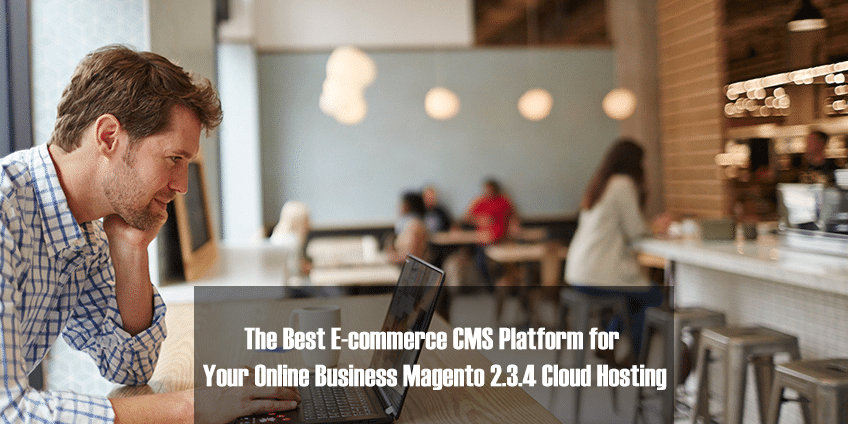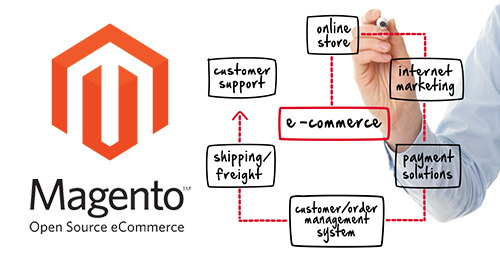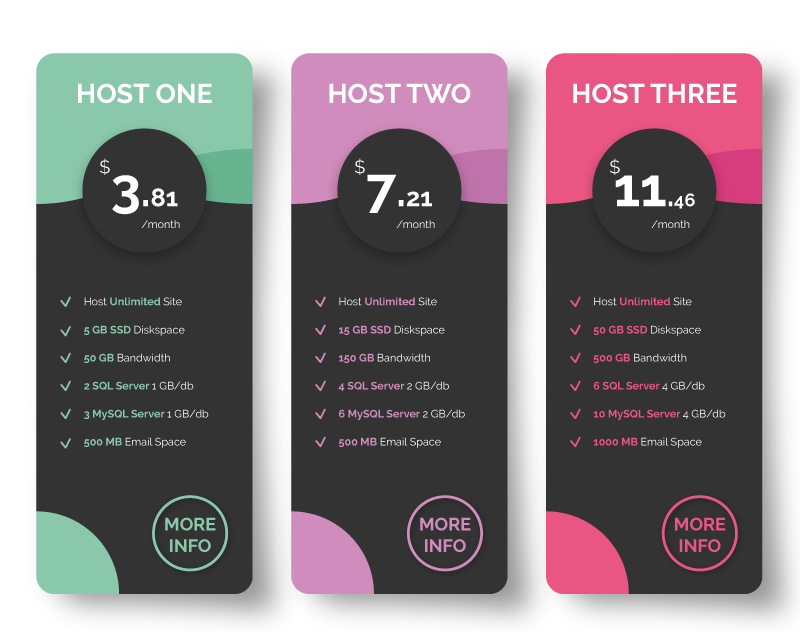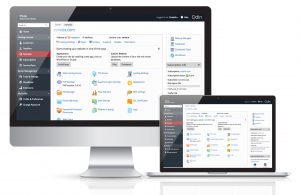The Best E-commerce CMS Platform for Your Online Business Magento 2.3.4 Cloud Hosting

E-commerce CMS Platform for Your Online Business

With digital buyer penetration predicted to edge near about 50% of overall Internet users in 2018, the e-commerce industry is ready to evolve and expand.
Last year more than 1 Billion Internet users made an online purchase and the numbers are continuously growing. This is probably the best time to jump in the line and start your online business if you have some amazing products to sell online.
However, an online business requires an eCommerce platform to start with and choosing the best e-Commerce CMS can be a lot of work. Apart from being visually appealing, your eCommerce website needs to be functional and cheap.
What is Magento?
Magento is an ecommerce platform built on open source technology which provides online merchants with a flexible shopping cart system, as well as control over the look, content and functionality of their online store. Magento offers powerful marketing, search engine optimization, and catalog-management tools.

Magento Community Edition is open source eCommerce software used to power hundreds of thousands of online stores. It can be downloaded for free and is most frequently used by developers and small businesses.
Magento is suitable for small e-commerce companies serving just one town or a state as well as MNCs. It grows with your business; regardless of the kind of e-commerce features or enhancements you need, Magento will never fail to surprise you (pleasantly, of course!).
No wonder why so many Fortune 500 companies (most having very complex e-commerce operations) are using Magento.

It is also possible to add customized back-end workflows to meet specific business requirements. With Magento, a modular ecommerce solution at the core, you’re in control of how you want your ecommerce website to look and perform.
With one backend CMS, Magento allows you to create multiple online stores.
You can control all of your inventory, billing tasks, customer records etc. from a single admin dashboard.
What’s New in Magento 2.3.4?
Highlights
Look for the following highlights in this release:
Substantial security enhancements
This release includes the following security enhancements:
Over 30 security enhancements that help close cross-site scripting (XSS) and remote code execution (RCE) vulnerabilities
No confirmed attacks related to these issues have occurred to date. However, certain vulnerabilities can potentially be exploited to access customer information or take over administrator sessions. Most of these issues require that an attacker first obtains access to the Admin. As a result, we remind you to take all necessary steps to protect your Admin, including but not limited to these efforts: IP whitelisting, two-factor authentication, use of a VPN, the use of a unique location rather than /admin, and good password hygiene. See Adobe Security Bulletin for a discussion of these fixed issues. All known exploitable security issues fixed in this release (2.3.4) have been ported to 2.2.11, 1.14.4.4, and 1.9.4.4, as appropriate.
Security enhancements and fixes to core code
Additional security enhancements include:
- Removal of custom layout updates and the deprecation of layout updates to remove the opportunity for Remote Code Execution (RCE). The Custom Layout Update field on the CMS Page Edit, Category Edit, and Product Edit pages has now been converted to a selector. You can no longer specify an entity-specific layout update with text but instead must create a physical file that contains the layout updates and select it for use.
- Redesigned content template features so that only whitelisted variables can be added to templates. This avoids the situation where administrator-defined templates such as email, newsletters, and CMS content can include variables and directives that can directly call PHP functions on objects.
Platform upgrades
The following platform upgrades help enhance website security and PCI compliance.
- Enhancements to the message queue framework. Magento now supports the latest release of RabbitMQ v3.8, which is the third-party technology that underlies the Magento message queue framework.
- Improved page caching and session storage. This release has been tested on the latest stable release of Redis v5.0.6.
- Enhanced support for MariaDB 10.2. Before Magento 2.3.4, when using declarative schema with MariaDB 10.2, Magento threw an error indicating that the schema was not up-to-date after running
bin/magento setup:upgrade. With this release, we have normalized the values returned by MariaDB, which allows system integrators to use declarative schema with both MySQL and MariaDB. - The core integration of the Authorize.net payment method has been deprecated. Please use the official payment integration that is available on Marketplace.
Note: Magento 2.3.4 has not been tested with PHP 7.1. PHP 7.1 reached EOL (End of Life) on December 1, 2019. We recommend updating your deployment to a supported version of PHP.
Performance boosts
Merchants and customers will see performance improvements as a result of these enhancements:
- Redundant non-cached requests to the server on catalog pages have been eliminated by refactoring the customer section invalidation mechanism and improving banner cache logic.
- PHTML files have been refactored to better support parsing by the bundling mechanism. Our new bundling mechanism now identifies all dependencies on JavaScript.
- Added the ability to disable statistic collecting for Reports module by default. A new configuration setting (System Configuration > General > Reports > General Options) allows merchants to completely or partially disable Magento Reports. (Statistics collection for the Reports module is disabled by default. Magento recommends disabling Reports functionality for performance reasons when this capability is not required.)
Infrastructure improvements
This release contains 250 enhancements to core quality, which improve the quality of the Framework and these modules: catalog, sales, PayPal, Elasticsearch, import, and CMS.
Merchant tool enhancements
- Integration with Adobe Stock image galleries. The new bundled Adobe stock integration extension enables merchants to add high quality media assets to their website content without leaving the Magento Admin. Merchants can use the searchable interface in the Magento Media Gallery to explore, preview, license, and deploy stock images in website content.
Inventory Management
Inventory Management enhancements for this release include:
- Addressed a known performance issue that caused higher than expected loads on the database server in scenarios involving the shopping cart.
- Updated the Inventory Reservations CLI command to reduce memory usage when finding and compensating for missing reservations on large catalogs.
- Resolved multiple quality issues, including those related to credit memos, grouped products, source and stock mass actions.
GraphQL
This release includes improved GraphQL coverage for search, layered navigation, cart functionality. The following mutations/queries are available:
- Guest carts can now be merged with customer carts. The
mergeCartsmutation transfers the contents of a guest cart into the cart of a logged-in customer. - A customer can start an order on one device and complete it on another. Use the `customerCart query to obtain the cart ID for a logged-in customer.
- Layered navigation can use custom filters. The
filterattribute of theproductsquery now requires theProductAttributeFilterInputobject. You can specify a pre-defined filter in this object, or define a custom filter. As a result, layered navigation on your website filters on the attributes you need. - You can search categories by ID, name, and/or URL key. The [
categoryList](/guides/v2.3/graphql/queries/category-list.html) query replaces the deprecatedcategory` query. - The
ProductInterfacesupports fixed product taxes (such as WEEE). Use thestoreConfigquery to determine whether to store supports these taxes. - The
cartobject has been enhanced to include information about promotions and applied discounts at the line and cart levels.
PWA Studio
For information on these enhancements plus other improvements.
dotdigital
- Live Chat powered by dotdigital enables merchants to increase conversion rates, and keep customers coming back with real-time engagement. All Magento 2.3.x merchants (both Magento Open Source and Magento Commerce) can receive a free live chat agent without the need for a full dotdigital Engagement Cloud license.
- Engagement Cloud includes a new Chat widget that makes it easy for shoppers to communicate in real time with customers as they shop in your store. Chat can be accessed from the Engagement Cloud section of the Magento configuration, or directly from your Engagement Cloud account.
Google Shopping ads Channel
Google Shopping ads Channel Release Notes describes all changes to this feature for Magento 2.3.x.
Vendor-developed extension enhancements
This release of Magento includes extensions developed by third-party vendors. It includes both quality and UX improvements to these extensions.
Klarna
Klarna Payments has a new Data sharing on load field in the Magento configuration that can be set to share customer data either after the transaction is authorized, or when the Klarna payment method is selected during checkout.
How to Choose Best and Cheap Magento 2.3.4 Cloud Hosting?
To choose hosting provider that fully support Magento 2.3.4 is not easy task. We highly recommend ASPHostPortal for your Magento 2.3.4 hosting partner. Not only offer cheap price, but also expert Magento 2.3.4 support team. You feel free to host your great Magento 2.3.4 site with their great Magento 2.3.4 hosting service. The following are the reasons why you should choose ASPHostPortal as your Magento 2.3.4 hosting partner.
Why ASPHostPortal is the Best and Cheap Magento 2.3.4 Cloud Hosting?
ASPHostPortal comes with eight Windows cloud hosting plan, and the prices start from $3.81/mo. You can start your Magento 2.3.4 site from $3.81/mo only. That certainly makes ASPHostPortal the cheapest Magento 2.3.4 cloud hosting in the field. Moreover, if there is anything wrong, customers can cancel the service, and ask their full money back within the first 30 days, according to ASPHostPortal 30 Days Money Back Guarantee.

ASPHostPortal.com – Plesk Control Panel
ASPHostPortal Windows Hosting comes with Plesk control panel. Plesk is best control panel to manage windows hosting. You can easily manage your server, email accounts with few clicks. You can instantly install over 100 applications on your website with just a few clicks. You can check everything about your website including disk space, traffic, logs & statistics and many more.

ASPHostPortal.com – 99.99% Uptime Guarantee
Does ASPHostPortal really give 99.99% up time? The answer is yes. ASPHostPortal Windows Hosting servers are capable enough to make your website 99.99% available. ASPHostPortal has established a world-class infrastructure making it possible to guarantee such a high uptime percentage. Of course there is always the possibility that some factor beyond the control of the ASPHostPortal Company will result in more downtime. Fortunately, this does not occur too often. Upgrades and maintenance downtime are acceptable and do not impact the uptime guarantee.
ASPHostPortal.com – Expert Support Team
In order to provide top-level web hosting service, ASPHostPortal.com offers 24/7 available technical support with professional and experienced support staffs via create ticket from helpdesk. Besides, those support staffs are been in this field for over 3 years, thus be able to offer efficient troubleshooting process, and provide the best resolutions to any issues raised by customers.